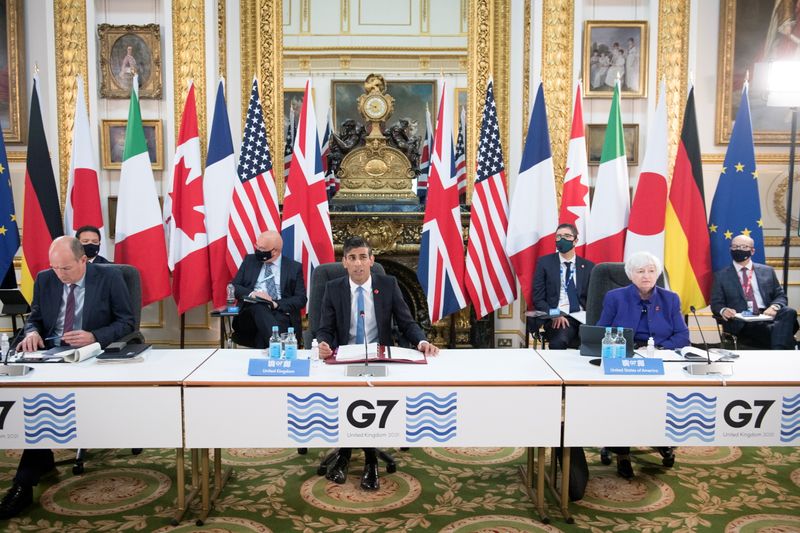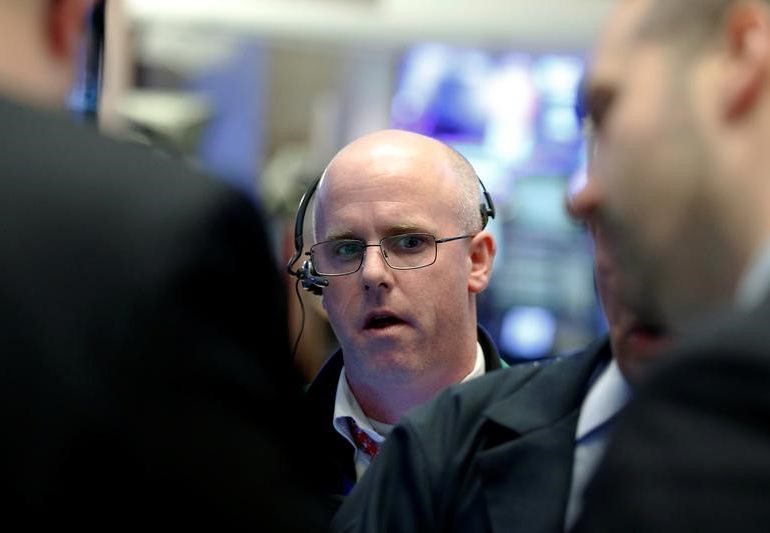 © Reuters. FILE PHOTO: Britain’s Chancellor of the Exchequer Rishi Sunak speaks at a meeting of finance ministers from across the G7 nations ahead of the G7 leaders’ summit, at Lancaster House in London, Britain June 4, 2021. Stefan Rousseau/PA Wire/Pool via REUTERS
© Reuters. FILE PHOTO: Britain’s Chancellor of the Exchequer Rishi Sunak speaks at a meeting of finance ministers from across the G7 nations ahead of the G7 leaders’ summit, at Lancaster House in London, Britain June 4, 2021. Stefan Rousseau/PA Wire/Pool via REUTERS2/2
By David Milliken and Kate Holton
LONDON (Reuters) -The United States, Britain and other leading nations reached a landmark deal on Saturday to pursue higher global taxation on multinational businesses such as Google (NASDAQ:), Apple (NASDAQ:) and Amazon (NASDAQ:).
In a move that could raise hundreds of billions of dollars to help them cope with the aftermath of COVID-19, the Group of Seven large advanced economies agreed to back a minimum global corporate rate of at least 15% and for companies to pay more tax in the markets where they sell goods and services.
“G7 finance ministers have reached a historic agreement to reform the global tax system to make it fit for the global digital age,” British finance minister Rishi Sunak said after chairing a two-day meeting in London.
U.S. Treasury Secretary Janet Yellen said the “significant, unprecedented commitment” would end what she called a race to the bottom on global taxation.
The deal, which was years in the making, also promises to end national digital services taxes levied by Britain and other European countries which the United States said unfairly targeted U.S. technology giants.
However, the measures will first need to find broader agreement at a meeting of the G20 – which includes a number of emerging economies – due to take place next month in Venice.
“It’s complicated and this is a first step,” Sunak said.
The ministers also agreed to move towards making companies declare their environmental impact in a more standard way so investors can decided more easily whether to fund them, a key goal for Britain.
Rich nations have struggled for years to agree a way to raise more revenue from large multinationals such as Google, Amazon and Facebook (NASDAQ:), which often book profits in jurisdictions where they pay little or no tax.
U.S. President Joe Biden’s administration gave the stalled talks fresh impetus by proposing a minimum global corporation tax rate of 15%, above the level in countries such as Ireland but below the lowest level in the G7.
Germany and France also welcomed the agreement, although French Finance Minister Bruno Le Maire said he would fight for a higher global minimum corporate tax rate than 15%, which he described as a “starting point”.
German finance minister Olaf Scholz said the deal was “bad news for tax havens around the world”.
“Companies will no longer be in a position to dodge their tax obligations by booking their profits in the lowest-tax countries,” he added.
Irish finance minister Paschal Donohoe, whose country is potentially a big loser with its 12.5% tax rate, said any global deal also needed to take account of smaller nations.
Sunak said the deal was a “huge prize” for taxpayers, but it was too soon to know how much money it would raise for Britain.
The agreement does not make clear exactly which businesses will be covered by the rules, referring only to “the largest and most profitable multinational enterprises”.
European countries have feared that a business such as Amazon could slip through the net as it reports lower profit margins than most other well-known technology companies.
Fusion Media or anyone involved with Fusion Media will not accept any liability for loss or damage as a result of reliance on the information including data, quotes, charts and buy/sell signals contained within this website. Please be fully informed regarding the risks and costs associated with trading the financial markets, it is one of the riskiest investment forms possible.

